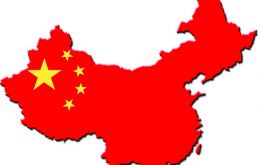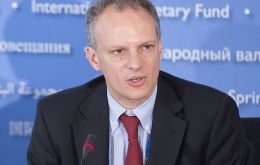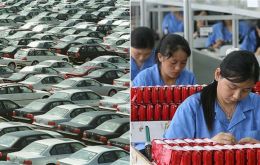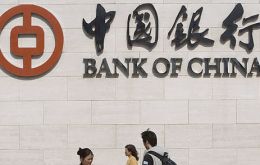MercoPress. South Atlantic News Agency
Tag: China economy
-
Wednesday, January 14th 2015 - 09:31 UTC
World Bank cuts 2015 global growth forecast; however lower oil prices will delay rate hikes

The World Bank on Tuesday cut its global growth forecast for 2015 and lowered the estimate for 2014, as several headwinds mitigate the effects of an improving U. S. economy and plunging oil prices.
-
Wednesday, December 3rd 2014 - 08:32 UTC
China's factory activity falls faster than expected as the economy keeps cooling

China's factory activity slowed by more than expected in November, highlighting how a cooling economy is impacting its vast manufacturing sector. The official purchasing managers' index (PMI) dipped to 50.3 in November from October's 50.8, closer to the 50 point mark that separates growth from contraction. It was below the 50.6 level expected by economists.
-
Monday, July 7th 2014 - 23:42 UTC
China economy with moderate growth in medium term, says World Bank

China’s growth will moderate over the medium term as the economy continues to rebalance gradually. Growth is expected to slow to 7.6% in 2014, and 7.5% in 2015, from 7.7% in 2013, according to the World Bank’s China Economic Update latest edition.
-
Thursday, April 17th 2014 - 04:58 UTC
China's economy expands 7.4% in first quarter and retail sales in March 12.2%

China's economy expanded by 7.4% in the first quarter of the year, better than what many were expecting, but it is a slowdown from 7.7% growth in the final quarter of last year. Other data released with the gross domestic product (GDP) figure showed industrial output rising 8.8% in March from one year ago.
-
Tuesday, April 8th 2014 - 19:10 UTC
China and East Asia expected to grow at slower pace this year, says World Bank

The World Bank has trimmed its growth forecast slightly for China, citing a “bumpy start to the year”. It now expects the Chinese economy to grow by 7.6% in 2014, down from its earlier projection of 7.7%. A slew of disappointing figures has triggered concerns of a slowdown in the world's second-largest economy.
-
Friday, November 1st 2013 - 05:40 UTC
IMF warns about global slowdown and appeals to Latam governments' prudence

The Director of the International Monetary Fund’s (IMF) Western Hemisphere Division, Alejandro Werner, says Latin American and Caribbean economies are well placed to once again sustain relatively high growth rates.
-
Friday, July 26th 2013 - 11:39 UTC
Beijing unveils measures to boost growth: tax breaks and railway construction

China has unveiled a series of moves aimed at boosting growth, indicating that policymakers are concerned about the slowdown in its economy. The steps include tax breaks for small businesses, reduced fees for exporters and opening up of railway construction.
-
Thursday, July 11th 2013 - 06:34 UTC
China’s June fall in exports and imports anticipate grim outlook for world trade

China has warned of a grim outlook for trade as the world's second-largest economy surprised financial markets by reporting a fall in exports and imports when both had been expected to rise. The June data showed that exports fell 3.1% from a year earlier and imports dropped 0.7%, according to customs officials.
-
Monday, October 15th 2012 - 18:42 UTC
China’s inflation eases as growth slows; plans to further boost domestic demand

China's policymakers have been given more room to boost stimulus measures after the country's inflation rate dipped in September. Consumer prices rose 1.9% from a year earlier which is down from a rate of 2% in August.
-
Tuesday, September 4th 2012 - 00:20 UTC
Growing fears China is slowing down faster than estimated

China's manufacturing activity fell to a nine-month low in August, adding to fears that its economy is slowing faster than estimated. The official Purchasing Managers' Index (PMI) fell to 49.2, the lowest reading since November 2011, data released over the weekend showed.
